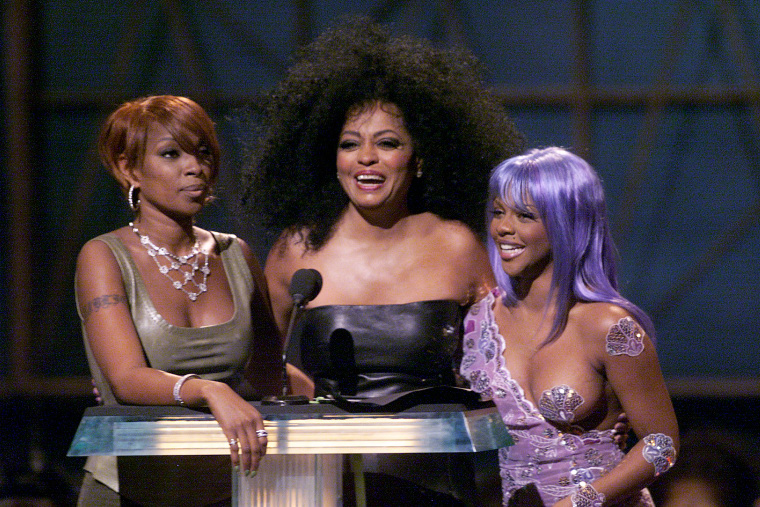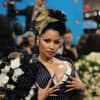Once upon a time, I would stay up way into the middle of the night to watch the VMAs. I lived an ocean and several time zones away from Radio City Music Hall, and even further from the occasional broadcasts that came through from Los Angeles, but MTV’s annual award show felt urgent. During a time before Instagram and Vine, and when paparazzi only chased the extremely rich or extremely famous, the VMAs were a temperature reading of the pop culture climate at any given moment. It was a rare opportunity to glimpse musicians and other celebrity figures being themselves, having fun, and doing or saying some silly things.
Between the fanciful outfits the show inspired and the ridiculous performances and zany moments Viacom scripted, the VMAs were more accessible than the Grammys, less stuffy. There was no moralizing from the RIAA to be endured, just an anti-smoking PSA from time to time. The things that happened at the VMAs felt important, and we’d talk about them for weeks. Remember when Lil Kim came through with her left titty out? Or when Tim Commerford scaled a massive set piece to protest a Limp Bizkit win?
 Getty/Scott Gries
Getty/Scott Gries
Eventually, I aged out of MTV’s demographic and as the once-dominant giant struggled to assert itself in the YouTube era, it felt more and more irrelevant. The VMAs were a three-hour long exercise in secondhand embarrassment. Plus, the once-thrilling clusterfuck of the award show began appearing every day on reality TV and across newly emerged gossip websites that proposed daily banalities as though they were cable-level occurrences.
More recently, though, following the emergence of the Twitter-viewing phenomenon, I picked back up on watching the VMAs, and other awards shows. The jokes and endless memes and the casual feeling of social inclusion made it feel worth it. I almost watched the Aaliyah Lifetime movie, just to know what all my Twitter friends were talking about.
But last night’s VMAs felt different. There were a lot of tweets and some good jokes, to be sure, but there was something else, too. From the beginning of the broadcast through to the ongoing media reaction cycle, it has felt like deep dread and immediate regret, like we had met the final boss of awards shows in the Miley Cyrus-hosted, Taylor Swift-dominated, Kanye- and Kim-surveiled event. The trauma of watching racist and sexist moments, and reliving them on my timeline with various captions attached, didn't feel good; it magnified the sociopolitical anxieties of everyday life.
 Getty/ Kevork Djansezian
Getty/ Kevork Djansezian
Two years ago, it might’ve felt like vindication to know I wasn’t the only one who had a problem with Miley’s faux-dreads, or with her use of the word "mammy" during a skit with Snoop Dogg, or her continued petulance towards Nicki Minaj. I would have been pleased to see tweets calling out Taylor Swift for the premiere of her "problematic” video for “Wildest Dreams” and for her performative white-girl fragility. Same for Rebel Wilson's unbelievable joke at the expense of black people murdered by the police. I would’ve enjoyed the affirmation of watching my carefully curated timeline cheer on Amber Rose and Blac Chyna’s anti-slut-shaming, if wholly promotional, red carpet look. I would’ve felt stronger seeing comments praising Kanye, and criticizing the media’s dismissal of his genius by reclassifying his speech as a “rant.” But it wasn’t quite the same this time around; nothing was fun and it all felt like punishment.
We’ve reached a point in social media culture in which we’ve collectively become more attuned to the significance of saying and doing offensive things, and of the consequences of celebrities’ hurtful actions. We know why Miley’s dreads are cultural appropriation, and why Zendaya got called a weed-smoker for the same look. We know not to use antiquated, racist coded language, like calling Nicki Minaj a savage. We know why Macklemore gets more mainstream looks than Kendrick Lamar. Yet it keeps happening, and we're expected to brush off the hurt. On the contrary, it feels worse. MTV knows better, and so does Miley.
The VMAs in particular have had a poor record of fairly rewarding greatness, but, watching the show, I kept thinking about this bit from Leon Neyfakh’s New Yorker profile of T-Pain: “The comedy rap group The Lonely Island featured T-Pain on their song ‘I’m on a Boat,’ performing more or less as a parody of himself. The song was nominated for a Grammy; when asked about the honor on the red carpet, T-Pain admitted it was kind of weird that his music didn’t get nominated, but a ‘mockery of the art’ did.”
That’s what the 2015 VMAs felt like. It’s not funny anymore, try different jokes.


